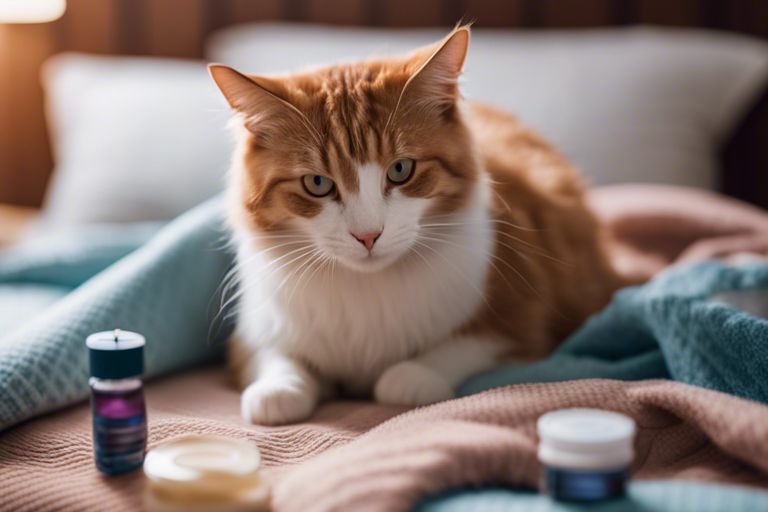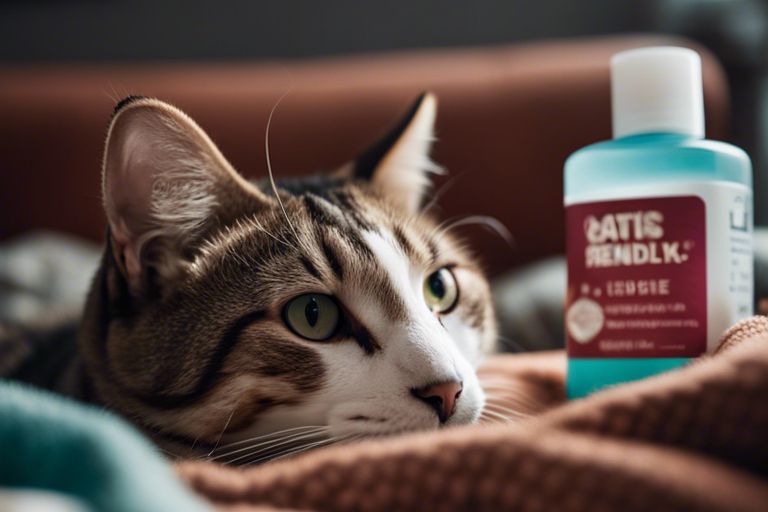Have you ever noticed your feline friend sporting a runny nose? While this can be a common occurrence, it may also be a sign of an underlying health issue that requires attention. In this blog post, we will explore the potential causes of your cat’s runny nose, the potential dangers associated with it, and what you can do to help your pet.
Key Takeaways:
- Cat Flu: Runny nose is a common symptom of cat flu caused by viruses like feline herpesvirus or feline calicivirus.
- Allergies: Cats can develop allergies to various environmental factors such as pollen, dust, or smoke, leading to a runny nose.
- Sinus Infection: Bacterial or fungal infections in the sinuses can cause a runny nose in cats.
- Dental Issues: Dental problems such as gum disease or tooth infection can also lead to nasal discharge in cats.
- Tumors or Polyps: In some cases, growths like tumors or polyps in the nasal cavity can cause a cat to have a runny nose.

The Basics of a Cat’s Runny Nose
Obviously, it can be concerning when your cat has a runny nose. Just as with humans, a runny nose in a cat can indicate a variety of health issues. Understanding the basics of why your cat may have a runny nose can help you to better care for your feline friend and ensure they receive the proper treatment.
What Is a Runny Nose?
A runny nose in a cat is typically a sign of an underlying issue. It can be caused by a variety of factors, including allergies, infections, foreign objects in the nose, dental problems, or even nasal tumors. When your cat has a runny nose, it means that there is an excess of fluid or mucous in their nasal passages that is causing the discharge. This can lead to discomfort and difficulty breathing for your cat, making it crucial to address the issue promptly.
Common Symptoms to Recognize
When your cat has a runny nose, you may notice other symptoms accompanying it. These can include sneezing, coughing, watery eyes, reduced appetite, and lethargy. It’s important to take note of these additional symptoms as they can provide valuable insight into the potential underlying cause of your cat’s runny nose. Additionally, if you observe any bloody discharge or difficulty breathing, seek immediate veterinary attention for your cat as these can be signs of a serious issue that requires urgent medical treatment.
Potential Causes of a Runny Nose in Cats
Some cats may develop a runny nose due to various reasons. Identifying the potential causes can help you understand the underlying issue and provide the necessary care for your feline friend.
Infectious Diseases
Infectious diseases, such as feline herpesvirus and feline calicivirus, can cause a runny nose in cats. These viral infections are highly contagious and often lead to upper respiratory symptoms. If your cat has been in contact with other cats or shows signs of congestion and nasal discharge, it’s important to seek veterinary care for proper diagnosis and treatment.
Allergies and Environmental Factors
Allergies to environmental factors, such as pollen, dust, or smoke, can also lead to a runny nose in cats. Additionally, exposure to certain chemicals or perfumes may trigger respiratory symptoms in sensitive felines. If you notice your cat having a runny nose during specific seasons or after exposure to particular substances, it could indicate an allergic reaction. After identifying the allergen, you can take steps to minimize your cat’s exposure and provide relief through appropriate veterinary care.
- Pollen
- Dust
- Smoke
- Chemicals or perfumes
Anatomical Issues and Congenital Conditions
Sometimes, anatomical issues and congenital conditions can contribute to a runny nose in cats. For instance, a deviated septum or nasal polyps may obstruct the nasal passages, leading to nasal discharge. Additionally, certain breeds with flat faces, such as Persians and Himalayans, are prone to respiratory issues due to their facial structure. If your cat has chronic nasal discharge or breathing difficulties, consulting with a veterinarian can help identify any underlying anatomical or congenital concerns.
Other Health Concerns
Other health concerns, such as dental problems or upper respiratory infections, can also manifest with a runny nose in cats. Dental issues, including periodontal disease or tooth abscesses, may cause nasal discharge due to their proximity to the nasal cavity. Moreover, tumors or foreign bodies in the nasal passages could lead to persistent nasal discharge and require prompt medical attention. If you observe any unusual or concerning symptoms in your cat, it’s essential to have them evaluated by a veterinarian to rule out any potential health concerns.
Diagnosis and Treatment
Not all cases of runny noses in cats require immediate treatment, but it’s important to be aware of the potential causes and seek a proper diagnosis from a veterinarian if your cat is experiencing this symptom. The treatment will depend on the underlying cause of the runny nose.
When to Visit the Vet
If your cat’s runny nose is persistent and accompanied by other symptoms such as sneezing, coughing, fever, or difficulty breathing, it’s critical to schedule a visit to the vet as soon as possible. These symptoms could be a sign of a more serious condition, and early diagnosis and treatment are essential for your cat’s well-being.
Diagnostic Procedures
When you take your cat to the vet, they will perform a thorough physical examination and may recommend diagnostic tests such as blood work, X-rays, or nasal swabs to determine the underlying cause of the runny nose. These tests are crucial for identifying infections, allergies, or other potential health issues.
Treatment Options and Home Care
The treatment for your cat’s runny nose will depend on the diagnosis. Antibiotics may be prescribed for bacterial infections, while antiviral medications may be necessary for viral infections. Your vet may also recommend supportive care such as keeping your cat hydrated, using a humidifier, and providing a quiet, stress-free environment. Following your vet’s recommendations and keeping an eye on your cat’s symptoms at home are key to their recovery.
Prevention and Management
Now that you understand why your cat may have a runny nose, it’s important to consider preventive measures and long-term management strategies to ensure your feline friend stays healthy. For more in-depth information on this topic, you can also refer to the resource on Sneezing and Nasal Discharge in Cats.
Preventive Measures for Respiratory Health
When it comes to maintaining the respiratory health of your cat, there are certain measures you can take to minimize the risk of nasal issues. Firstly, make sure your cat’s living environment is clean and free from potential irritants such as cigarette smoke, strong perfumes, and airborne allergens. Regularly clean your cat’s bedding, toys, and litter box to reduce the buildup of dust and bacteria. Additionally, ensure your cat is up to date with vaccinations to protect against respiratory infections. Lastly, a balanced diet rich in essential nutrients can help support your cat’s overall immune system, contributing to their respiratory health.
Long-term Management of Chronic Nasal Issues
If your cat has chronic nasal issues, it’s important to work closely with your veterinarian to develop a long-term management plan. This may involve using prescribed medications to alleviate symptoms and manage any underlying conditions. Your vet may also recommend regular check-ups to monitor your cat’s respiratory health and make any necessary adjustments to their treatment plan. Additionally, keeping your cat’s living environment clean and free from potential irritants will continue to be crucial in managing chronic nasal issues.
Why Does My Cat Have a Runny Nose?
Taking this into account, if you have noticed that your cat has a runny nose, it could be due to a number of reasons. Common causes include allergies, infections, foreign objects in the nose, or dental problems. It is important to monitor your cat’s condition and consult with a veterinarian if you have any concerns about their health. The veterinarian can provide a proper diagnosis and recommend the appropriate treatment to alleviate your cat’s symptoms.
FAQ
Q: Why does my cat have a runny nose?
A: There are several reasons why your cat may have a runny nose. It could be due to a viral or bacterial infection, allergies, foreign objects in the nasal passages, or even a dental issue. It’s important to consult with a veterinarian to determine the underlying cause and provide appropriate treatment.
Q: What are the symptoms of a runny nose in cats?
A: In addition to a runny nose, symptoms of nasal issues in cats may include sneezing, coughing, wheezing, difficulty breathing, loss of appetite, and lethargy. If you notice any of these symptoms in your cat, it’s essential to seek veterinary attention as soon as possible.
Q: How can I help my cat with a runny nose?
A: To help your cat with a runny nose, keep their environment clean and free of potential irritants. Ensure they have access to plenty of fresh water and monitor their eating habits. It’s crucial to follow your veterinarian’s recommendations for treatment, which may include medication, nasal rinses, or other interventions to alleviate the underlying cause of the runny nose.

Jayley, a devoted cat enthusiast, also writer for other cat blog as well. She aims to dedicated to providing comprehensive information, insights, and advice on everything you’d ever want to know about our whiskered companions.
